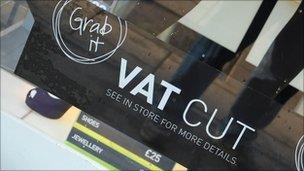UK tax gap narrows to £35bn, says HMRC
- Published

VAT collection has been one of the key issues for HMRC to deal with
The amount of tax that went uncollected in 2009-10 was estimated to be £35bn, HM Revenue and Customs (HMRC) has said.
This was £4bn less than the previous year and the lowest since 2004-05, the figures show.
The tax authority said the key reason for the drop was the reduction in VAT from 17.5% to 15% from December 2008 to the end of 2009.
In total, 7.9% of all tax went uncollected in 2009-10, compared with 8.1% the previous year.
VAT remained the tax recording the biggest shortfall, with £11.4bn uncollected. That meant 13.8% of the total amount of VAT due was not collected in 2009-10.
The next largest loss was £5.8bn of income tax due to inaccurate self-assessment returns.
Moonlighters
The annual amounts of income tax lost to deliberate evasion remained at the same, relatively small, level as the previous year.
Of the £14.5bn of direct taxes - income tax, national insurance and capital gains tax - not collected, £1.3bn was attributed to "ghosts", who are people who fail to declare their taxable income.
Some £1.8bn was attributed to moonlighters, who are people who fail to declare income from a second job.
Businesses failed to hand over an estimated £4.8bn in corporation tax, the HMRC estimates show.
The least effective tax was on hand-rolled tobacco, where 46% of all the tax (£600m) went uncollected owing to smuggling.
Evaders 'challenged'
HMRC's estimate of uncollected tax is based on evidence they uncover from cases they pursue, as well as spotting gaps in businesses' books during regular checks.
In the 2010 Spending Review, the government handed HMRC £917m in funding to tackle the tax gap, with a target to raise an extra £7bn a year by 2014-15.
"Although these numbers show continued progress by HMRC in reducing the tax gap, there is no room for complacency," said Exchequer Secretary to the Treasury, David Gauke.
"Just in the last few weeks we have challenged offshore tax evaders, closed tax avoidance loopholes and created a new HMRC unit to ensure that the wealthier members of society pay their way.
"We will continue to take action to prevent a minority of rule breakers dodging their responsibility to pay the right tax at the right time."